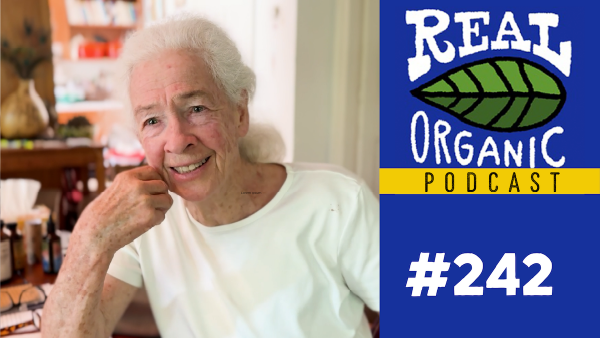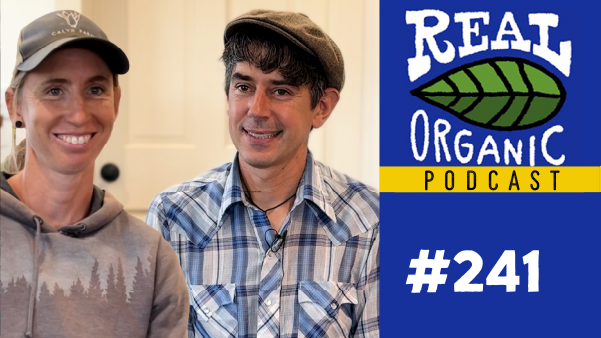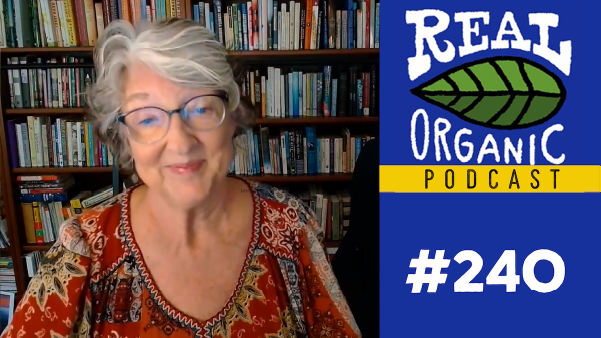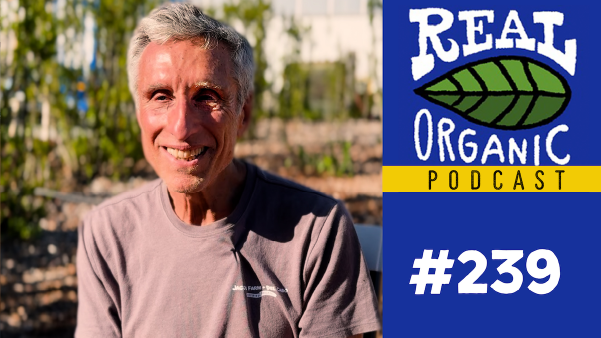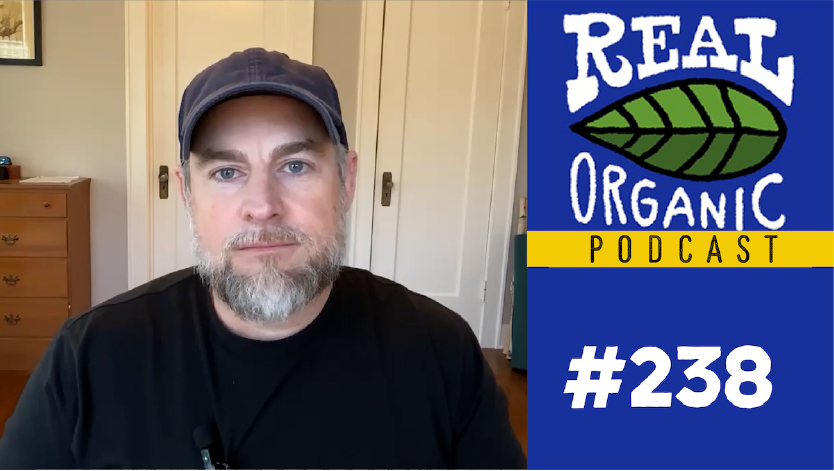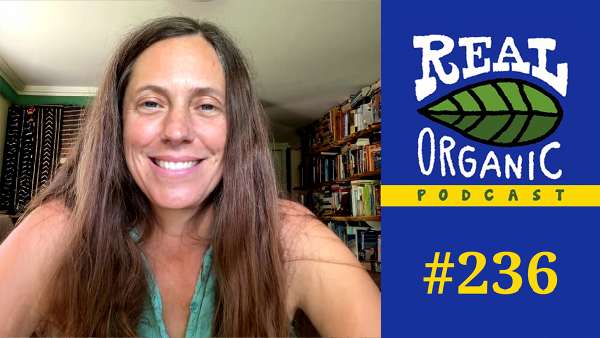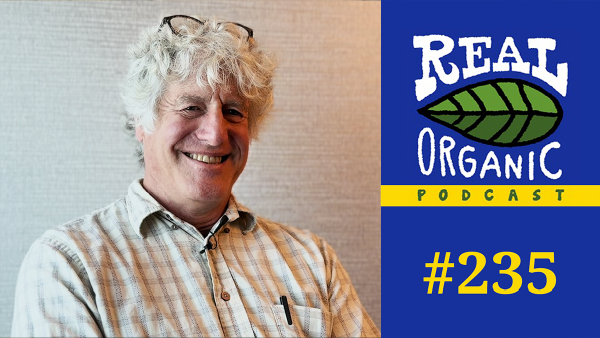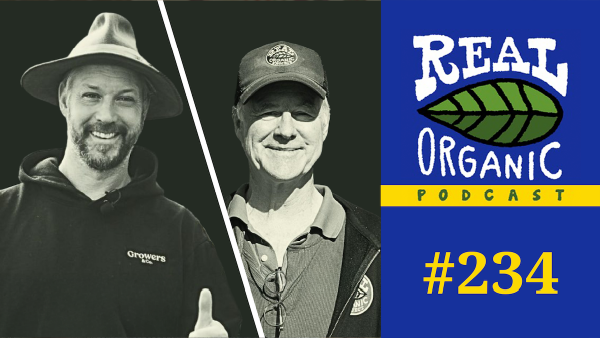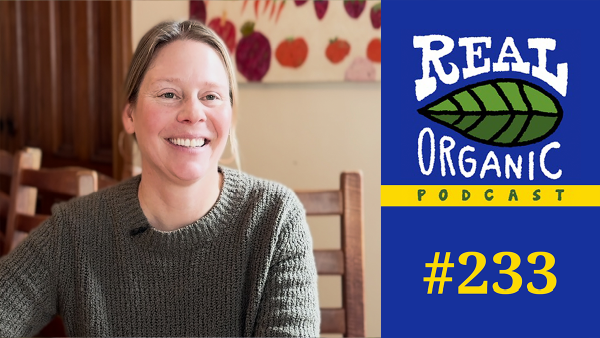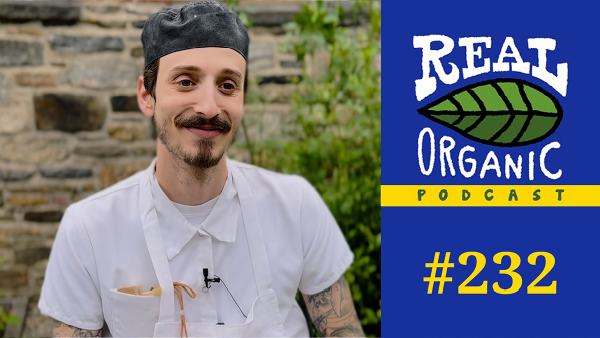Episode #237
Dick Schwartz: IFS and the Middle Way
How can the way we understand ourselves shape the way we change the world? Dick Schwartz, creator of Internal Family Systems (IFS) therapy, returns to share how the model he founded offers a “middle way” for navigating activism and conflict. By leading from self, rather than fear or rage, Dick shows how individuals, communities, and corporations (the entire food system!) can reduce polarization and create lasting change.
Our Dick Schwartz interview has been edited and condensed for clarity:
You can subscribe and download episodes of our show through your favorite podcast app, our YouTube channel, or stream the audio-only version here:
Dave Chapman interviews Dick Schwartz at the Cape Cod Institute, July 2025:
Dave Chapman 0:00
Welcome to The Real Organic Podcast. I’m talking today with Dick Schwartz, a friend and teacher from whom I’ve studied Internal Family Systems, the school of psychotherapy, with him for years. Welcome, Dick.
Dick Schwartz 0:17
Thanks, Dave.
Dave Chapman 0:19
One of the things that has been clear over those years is that Internal Family Systems, which I’ll just call IFS, has grown far beyond just the world of psychotherapy. You and this community have been the finding ways – I think they’re obvious in retrospect, though I don’t know that they were obvious in the beginning – in which IFS is useful as a tool for dealing with problems not just on our internal stage, but in our community as well.
Dave Chapman 1:01
We did an interview about three years ago, and I recommend it to people, in which you lay out the foundations of IFS. But I want to dive in today with a couple of questions about how this works in our greater world. I deal with a lot of things through the Real Organic Project, and a lot of questions. I told you two brief stories that I want to repeat to tee up this conversation from other people that I interviewed. One was Bill McKibben, and one was Paul Hawken.
Dave Chapman 1:36
Bill told me something that really resonated with me. He said, “For years, I thought we were having a debate, and then I realized we’d won the debate a long time ago. In fact, we were just having a fight, and it was a fight, as it always is, with money and power.” He was talking explicitly about the struggles around climate and how to repair our actions there.
Dave Chapman 2:08
It made me realize that at first I thought we were having a debate about these issues around organic agriculture – what it means, why it’s important, and its integrity. In fact, we weren’t having a debate; we were having a fight, and it was a fight with money and power.
Dave Chapman 2:32
For another point of view, I told that once to Paul Hawken – probably while doing an interview – and Paul said, “I don’t agree with that. I don’t think that’s a helpful way to look at it.” I will have to paraphrase, but basically he was saying that to think of what we’re doing as fighting is greatly limiting. He said, “What did we ever win by fighting?”
Dave Chapman 3:00
I recently answered, “Well, we ended the death camps in Germany, and we ended slavery in America, and women got the vote.” A lot of things have actually been won by fighting. Fighting was never a great solution, but sometimes it seemed like the only solution.
Dave Chapman 3:22
So, I throw this out to you because I have different parts that react differently to those statements. I’m trying to find the way that will lead to the change that we want to get to.
Dick Schwartz 3:55
I’m sort of between those two positions in the sense that fighting is necessary, like you said, at times, but the place from which you fight is crucial. I think this is part of why there’s so much polarization in the world now. If you’re fighting from these very righteous, angry parts that are “shaming the enemy,” then the enemy is likely to escalate.
Dick Schwartz 4:23
If you’re fighting from what I call “self” – and I talk about these 8C words, three of which are Courage, Confidence, and Clarity, as well as Compassion, – then your impact will be quite different in whatever way you fight. That’s been my journey. I’ve been working now with prominent social activists to try and help them do their activism from self, rather than from the parts that got them into the activism, because most of us, when we get charged up about an issue, it’s because of burdens we carry from something similar happening to us when we were younger, or something like that.
Dick Schwartz 5:15
That’s great in terms of motivating, but it isn’t always great in terms of outcome. What I’m calling “self” can be extremely forceful and fierce, even at times, but because you’re not disconnecting entirely from your compassion, even for the enemy, whatever message you’re sending or whatever action you are taking is received very differently. Again, sometimes it’s involving violence, perhaps necessarily, but a lot of times, coming to the fight from self diffuses that possibility.
Dave Chapman 6:04
I’m curious if there are examples for you in our recent history of people who you think really were able to take on very difficult, terrifying issues with a lot of self energy, and things changed as a result.
Dick Schwartz 6:25
There are the obvious examples, like Martin Luther King and others who are generally cited.
Dave Chapman 6:39
Martin Luther King is an amazing example and also the example that first comes to my mind, Nelson Mandela, Gandhi.
Dick Schwartz 6:49
Nelson Mandela and Gandhi. Gandhi was in parts a lot of the time.
Dave Chapman 6:55
What does that mean?
Dick Schwartz 6:58
He was not a nice person to a lot of the people around him, so he wasn’t walking his talk so much. But Nelson Mandela, Martin Luther King, I could probably come up with a few more names, but the power of their presence, pointing out injustice, and showing people, rather than attacking them, is what I’m talking about.
Dick Schwartz 7:37
Had they been in that rageful part or righteous… They were forceful, and they were clear, and they stood up, but there wasn’t that edge that pointed to the enemy and said, “You’re bad.” Those are good examples.
Dave Chapman 8:10
We watched a session you did today filmed in Israel. You were working with Jewish and Palestinian Israelis who were working to have a dialogue, working to work together on peace, but they were being honest about the things that blocked them inside each of them, saying there were two people in particular.
Dave Chapman 8:37
Could you talk a little bit about that? I was so impressed. You were there. You were conducting the session. I know this was 12 years ago, so you’ve been working on this for a long time. It’s a huge issue in our country’s life right now, this conflict. I would have thought, at the very least, it was intimidating to be taking on this huge challenge.
Dick Schwartz 9:09
I can’t say that I took on the whole challenge, but I’m good at helping people – even very polarized people – have dialogues, and so I just brought that framework to this work. What you saw was what we find a lot of the time when we go to these places: even people who are well intentioned, and they come wanting to hear the other, but as they try, what we call legacy burdens interfere.
Dick Schwartz 9:44
What I showed today was the legacy burden in the Israeli Jew that related to the Holocaust that made her terrified to let the Palestinians have any kind of voice or power in her country, even though she was working for peace. So, we had to go to that fear and get her to separate from it and get curious about it and learn where it came from, which was from the Holocaust, which was clear. Then we had to negotiate with her about whether or not she needed to carry that.
Dick Schwartz 10:25
Initially, she was very blended with the part and said, “Of course, every Jew knows, if we don’t carry all this fear, it’s going to happen again.” That is the common response. I was able to ask her, “If you didn’t have this fear, would you stop working for peace, and would you stop trying to stand up for Israel?”
Dick Schwartz 10:53
She thought about it and said, “No, I wouldn’t. I’d still do it.” “How would it be different? What would be different?” “I wouldn’t do it from a fearful place.” Then going back to the part, it was still very reluctant to let it go, and said, “We can’t let go of this until all the surrounding countries are self-led.” It was a long negotiation.
Dave Chapman 11:21
Because there are actual threats.
Dick Schwartz 11:23
Yeah.
Dave Chapman 11:24
That was what was so interesting that…
Dick Schwartz 11:28
I couldn’t argue. I couldn’t say “It’s all safe where you are,” but what I could say was, “This fear doesn’t serve you in terms of protecting yourself. Actually, it makes it more likely to get attacked.” It was an example of how these legacy burden parts don’t trust self. They don’t know about self. They think you’re still a little kid, and they have to constantly keep you afraid, keep you on guard, or you’re going to be ambushed.
Dick Schwartz 12:04
So, helping these kinds of parts get to know that there is somebody in there who has all these C word qualities that can keep everybody safe without constantly carrying that gnawing fear that is actually very unhealthy for people to carry.
Dick Schwartz 12:26
Such that, as was clear in the video, we finally got the part to agree to take the fear out of its body, in addition to the memories she put into a museum and so on. The part immediately transformed and grew up and became a source of strength that could stand behind her and help her be strong. That’s what it’s designed to do – that’s what its role is.
Dick Schwartz 12:57
So, it isn’t like if you unload the fear, you’re not going to have parts help you be careful, discerning, and be strong; you’re going to help them do that from an unburdened place, rather than from all this historic terror.
Dave Chapman 13:17
Yeah. Something I think it was Mike Elkins, who I heard it from, which is that the parts that protect us tend to draw down the very things that they’re trying to protect us from, that they become sort of magnets for these problems.
Dave Chapman 13:38
I can see what you’re saying because what was interesting was that she could separate from the fear and actually let that fear go and still keep the care, the concern, and the memory of what had happened. She didn’t become childlike or naive; she just wasn’t burdened by these centuries of fear.
Dick Schwartz 14:04
Yeah. By the end, after she had done it, you could see she had a very different connection to Jamal, the Palestinian man, and was able to collaborate much more easily because she wasn’t on guard all the time and the voice was saying, “But don’t totally trust and don’t give them more power,” and all that.
Dave Chapman 14:31
That was 12 years ago, and just to say, everyone always asks, “Well, wait. What happened after?” One of the things that I often feel is that we’re trying to push a rock up a pretty big hill. I don’t see any path toward an easy solution or resolution. What you started there, what was started by those communities coming together, continues even in the maelstrom that is there now.
Dick Schwartz 15:06
Yeah. I was collaborating with a group called Together Beyond Words. It’s only expanded. When I was doing it, it was just Nitsan Joy Gordon, who’s the founder, running these groups. They weren’t very big, and now there are 20 of these groups happening all over Israel, and there are lots of volunteer IFS therapists who are helping both those group leaders and also helping people on both sides who have been traumatized by this conflict.
Dave Chapman 15:43
It’s a beautiful thing, because I think people feel hopeless. They don’t know even how to begin to address the inertia of those legacy burdens.
Dick Schwartz 16:01
That’s right. Part of what keeps me going is seeing the power of legacy unburdening, the idea that maybe we can do that – we can scale that – so that we do it in large groups. Also a kind of intuitive knowledge that when one person unburdens, it’s not just that person; there’s a kind of ripple effect, and we’re pumping out a lot of this darkness that has accumulated because of all these conflicts and violence on the planet. Even if it doesn’t seem evident immediately, the act of the collective unburdening is having an impact. It’s pretty large.
Dave Chapman 16:49
We have, of course, our own struggles in this country right now. You said something a couple of days ago about America. I think you said 60% of our citizens are living paycheck to paycheck, that they are facing a seriously threatening economic situation, that’s very vulnerable that if you miss a paycheck, your whole family might be on the street.
Dave Chapman 17:29
You talked about how we’ve created economic exiles. Did I get that right? When we talk about it in IFS, exile is something that happens inside our body. But this is something happening outside. We are exiling other people. Is that what that means?
Dick Schwartz 17:48
That is what it means. I’m very interested in the parallels between the inner world and the outer world. They’re very obvious when you start thinking about them. So, if I’m working with a person, a client, who has a lot of inner exiles, they’re going to have to have a lot of protectors to keep those contained and to protect them. Those protectors are going to be quite extreme because so many things could trigger the exiles, and then they’ll explode.
Dick Schwartz 18:24
You take countries that have gotten to where our country has gotten through rugged, individualist ideas about meritocracy, and if you’re poor, it’s for your own fault because you didn’t work hard enough and all these burdens that are driving our politics. You take a country like that that has been living that for now, basically since I was a kid. When I grew up, one middle-class income would take care of lots of people.
Dick Schwartz 19:02
Now it’s impossible because of the tax structures and so on that Reagan initiated, and the Republicans have just piled on to the point where there’s this unbelievable imbalance where… I don’t know how many. The richest people in the country have more than 60% of the country, or something like that.
Dave Chapman 19:35
Yeah, it’s crazy.
Dick Schwartz 19:35
It’s crazy. That creates these economic exiles. Any system at any level, when it has a lot of exiles, is going to have very extreme protectors, and that’s what we have now. They’re extreme on both sides. They polarize with each other, and the more one gets extreme, the more the other has to go the opposite direction. There’s no self to be found when protectors get that extreme.
Dave Chapman 20:10
Can I go back for a minute?
Dick Schwartz 20:12
Yeah.
Dave Chapman 20:12
I want to keep going, but when you say “we create economic exiles,” we do it because our economic system is designed to basically… it’s not the intention, but it traps the majority of people in poverty. That is what makes them in exile?
Dick Schwartz 20:12
Yeah.
Dave Chapman 20:13
Does that mean, like when we talk about the inner system, it means our exiles are things that we want to lock away, we don’t want to deal with them. They’re too painful. So, society at large is locking away those people, and it’s such a large number of people, of course, it becomes a massive problem for society at large.
Dick Schwartz 20:57
Yeah. There’s huge amounts of suffering and pain that is ignored basically, and the people who rise to the top to lead – politicians, a lot of them – have their own exiles, and they have their own protectors that just reinforce that. They got there because they have these striving protectors that work and work and work to keep away from their own worthlessness and powerlessness.
Dick Schwartz 21:33
So, they’re seeking more and more power, and they get to the top, and then they have the same contempt for their own exiles that they have for the exiles in our country. Does that make sense?
Dave Chapman 22:02
Yeah. Those economic exiles are looking for protectors. They have them in themselves, of course, but they are looking for ways to be protected from the system.
Dick Schwartz 22:02
Yeah. Part of what I think happened in this last election is so many economic exiles felt totally cut out and unrepresented, and saw all these, what they call the elites, having a great time not addressing their fears. The Democrats basically touted what a great economy we have. That was their selling point.
Dick Schwartz 22:38
So, many people felt like, “Forget you. You don’t speak for me.” Then Trump came in and had a way of conning them into believing that he’s actually going to save them. That’s where we are.
Dave Chapman 22:56
Going forward with that, do we need to change the economy in order to free those exiles? We need to make it so that rich people aren’t so rich, and poor people aren’t so poor?
Dick Schwartz 23:19
Yes. Bernie Sanders has been talking that way for years. As long as you’re going to have that level of disparity, you’re going to have this kind of system. You can’t not have it. That’s true of systems at any level – any system that has that kind of disparity – that level of exiling – is going to have extreme protectors.
Dave Chapman 23:48
Good. Help me out, because I have to speak about this in about two months at a conference that we’re organizing about monopoly in the food system. Monopoly is always about making a small number of people very wealthy and very powerful, and most people very powerless. What are the words that you would use, or what is the path that you might lay out? What do we do?
Dick Schwartz 24:20
Some of my path has been to try to bring this framework, this paradigm, to the culture, so that as people are able to heal a lot of their fear or a lot of other kinds of, like you’ve been watching this week, they get more and more self-led, and become more and more… First of all, they see the injustice with more clarity, they have the courage to act, to deal with it, and they start to become much more active.
Dick Schwartz 24:58
One of the visions is to activate this huge population of people and help them snap out of the trance they’ve been in with Trump and start to push for change. That’s starting to happen with this Epstein thing. Then I’ve had the opportunity to work with people at high levels of power and help them go to their exiles and heal their exiles that drove them to need all this and to need all these material things.
Dick Schwartz 25:42
Because when you have a lot of exiles, you feel kind of empty. It’s like you have a bucket with a hole in it, and you’re trying constantly to fill that bucket with material things and power. As people heal, they don’t need all that anymore, and they become much more generous. So, it’s working both sides as much as I can.
Dave Chapman 26:05
In your experience – because I think you’re envisioning a mass change. A change of people’s values and what drives them – do you think that is going to require intensive therapy? Do we need an army of IFS therapists, or is this going to be something where you could suggest to people that they could give away their fear and keep their intentionality, commitment, and dedication to create change, but they don’t need the fear and the rage?
Dick Schwartz 26:55
Yeah. A lot of the guidance now for me is to bring this more directly to the public on a large scale. Up till now in my career, up till the last couple of years, my focus has been to train therapists to do it. But now it’s clear that something bigger needs to happen quicker.
Dick Schwartz 27:19
So, we have a number of different projects to try and both provide opportunities, often free, for people to experience it and to find that things go better when you don’t try to exile these parts, or when you don’t go to battle with these protectors, and you listen to them and you help them all come home, and that there are ways people can do that on their own or with a friend, so we’re trying to set that up.
Dick Schwartz 27:50
As people get that and get more and more excited about it, which has happened in the therapy world, the paradigm starts to change for how to work with yourself, how to understand how much to love yourself, and how to love yourself. As you can do that with yourself and your parts, then you are much better able to do that with people, especially when they resemble your parts.
Dick Schwartz 28:19
That’s the bigger vision of what we’re trying to do now, and it may not happen in my lifetime, probably won’t, but it’s something that I’m trying to leave as a legacy.
Dave Chapman 28:31
Yeah. I’ve come to accept that our work has to be generational. Not that we should say, “Well, the kids will fix it,” but that’s… I think one of the great challenges is people feel, “I can’t change this. I can change my life, but I can’t change this world that we live in and so many of the issues.”
Dave Chapman 28:56
It’s fascinating that our vision has gotten much bigger thanks to walking on the moon and seeing the Earth from that perspective, and seeing the planet as a whole, and coming to a much more sophisticated understanding about climate, and what happens in Brazil actually really impacts my children’s future, and what happens here really impacts the children’s future in the Middle East – that we are all connected. But seeing that, you go, “Oh, my God. I don’t even know where to begin.”
Dick Schwartz 29:31
Yeah. I don’t know if you saw the image online of four men in a boat, like a rowboat, and there’s a hole at one end, and the water’s coming in. The two at that end are bailing like crazy, and the two at the other end are saying, “Thank God, that’s not us. We’re not sinking like them.” That’s where we are. The people who are still doing okay are really good at denying what’s happening.
Dick Schwartz 30:06
Some of what I’m trying to do is work with those denying parts so that the self can see what’s happening from a systems point of view, like you’re saying, and see that we are all connected at that bigger level. That each person, as they access more self and start to act, has ripple effects.
Dick Schwartz 30:32
That’s something I know intuitively, but if you could actually believe that as one of these people who says, “What can I do?” and actually take that in, that’s enough of a motive. What I’m doing, both in terms of unburdening and bringing more self-leadership to any level of system, has massive ripple effects.
Dave Chapman 30:58
Yeah. There’s your role as a hope merchant.
Dick Schwartz 31:32
That’s me.
Dave Chapman 31:08
That’s right and good. I’m struck by how dreadfully so many revolutions fail. They are fueled by anger, rage, and fear, but they’re always aspirational – that we will completely change things and make them better, and so often, they don’t. They often make things worse, and they certainly just trade one group of oligarchs for another group of oligarchs.
Dick Schwartz 31:44
No, it’s that pendulum. If you come to a problem from an extreme place, you might temporarily get a change, but there will be this backlash much of the time. That’s what we’re going through now with Trump. He’s erasing all the progress that was made with DEI, and because the energy from the left wasn’t self-led – it was condescending and righteous and made everybody feel ashamed on the other side – when they have a chance, they’re going to backlash.
Dave Chapman 32:31
Part of you’re proposing is that we treat each other with a lot of respect.
Dave Chapman 32:38
Yeah.
Dave Chapman 32:39
I know that. It’s not that we are so divided.
Dick Schwartz 32:43
Yeah. But to do that, you have to see past the protectors in your enemy and see both the exiles driving them, and also see that they have a self that isn’t any different from yours. If you can understand that about your enemy, then you can connect at a totally different level. Both sides can put aside their protectors, which is what we did in the video today.
Dave Chapman 33:15
Yeah, that was beautiful and real. One other thing I want to touch on, which is connected to this, is that our economy is completely dominated by corporations. It’s not true in the whole world, but it’s certainly true in America. I know people who work with corporations – very closely, some of them – and feel that if we want to create change, we need to deal with the big dog in the room.
Dave Chapman 34:01
But I have a part that is deeply suspicious of thinking that that’s how we’re going to create change, because even people who have changed in themselves… The example that is so vivid for me is a man named Emmanuel Faber. He was the CEO of Danone, which owns Danone in North America. It’s a huge, huge company, the second-biggest dairy in the world, and owns many smaller brands in America.
Dave Chapman 34:35
I encountered the company because one of the brands they own is Horizon Organic, which is an organic milk company, and they were doing bad things. They were supporting the erosion of integrity of organic by getting milk from these huge confinement livestock places. They happened to be feeding certified organic grain, but that was the only thing that made them organic. I think of organic as being much more than that.
Dave Chapman 35:04
I encountered the story of this guy, and he had true vision. He was one of the more moving speakers I’ve ever heard, and he was going to change Danone and say, “We can’t just be selling toxic food. We need to be selling food that nourishes people. We need nourishment.” “Okay, I’m all in.” I think he meant it. I don’t know what he could have accomplished if they hadn’t had a down quarter, but they did. There was a small shareholder rebellion, and they got rid of him.
Dick Schwartz 35:40
Now that’s a big problem. We’re training coaches now – we have training programs in IFS – who are working with those kinds of people. You can get them to be self-led, but the system itself, where they’re so beholden to their stockholders that if they don’t ravage, then they’re going to be fired, needs to change too. That’s a big challenge.
Dave Chapman 36:14
That’s a big challenge because the system has the stability that systems do, and so you can push on the system and something else bulges, but it’s very hard to actually create change.
Dick Schwartz 36:25
Yeah. It’s the same thing that’s happening now with AI, where American AI companies are saying, “Well, if we don’t keep going without any restrictions, China is going to beat us, and then we’ll be eliminated, and China will take over.” There might be truth in that, but we’re all going toward the edge of the cliff as we do that because unregulated AI is going to kill us all.
Dick Schwartz 36:44
So, it’s a dilemma that there’s truth in what they’re saying – if you don’t make a lot of profit, some competitor is going to take over – but it’s very similar to what, in the video, Noah was saying: unless all the surrounding countries are in self, they can’t give up the sphere. Do you know what I’m saying? Yeah. We got her to give it up.
Dave Chapman 37:30
Yeah, that’s right. When we started the Real Organic Project, we had tried – and others had tried much longer than me – to reform the USDA’s National Organic Program, and we failed. In our face, the degree to which we had failed, we were trying through regulatory change and bringing people together, writing letters, marches, and all that, and it failed.
Dave Chapman 38:05
We started and said, “Well, we’ll do it ourselves. We won’t wait for permission from the federal government,” which is like “Waiting for Godot.” You might wait a very long time. Okay, well, that’s good. It’s building that small farm revolution and this underground economy, but 99% of the food is bought and sold in the supermarkets, which are now owned by a handful of multinational companies. It’s going the other way.
Dave Chapman 38:35
So, the question is, do we need to address that, or should we just keep building an alternative?
Dick Schwartz 38:45
That’s an important question. There are self-led corporations that can be models for what’s possible and still make a profit, both in terms of how they treat their employees and how they relate to the world, the environment, and so on. It’s great to have those models out there just to show these other companies, or the leaders of those companies, that there is an alternative, that there’s a different way to do it without being so rapacious.
Dick Schwartz 39:16
Unless we can have a massive cultural paradigm shift that allows all of us to go in and heal a lot of this stuff that drives those parts that are so materialistic and so scared of scarcity, it’s really hard to believe that many of these larger things are going to change. So, that’s part of what drives me – just trying to bring that paradigm shift.
Dave Chapman 39:49
That’s good – to re-shift the focus. Instead of just saying, “Well, I’d like to get this kind of economic system or this kind of food system,” we need to get a paradigm shift in how we relate to wealth, power, and community in order to get those things.
Dick Schwartz 40:12
Exactly. To do that, you have to change the way you understand the mind – that it’s not a dog-eat-dog thing inside or outside; there is this beautiful self in everybody. It’s just covered over by these burdened parts that come from trauma – some of the traumas from centuries ago. As people get that more and more and become more self-led, that’s what starts to shift things.
Dave Chapman 40:43
Yes. In the meantime, we have the challenge, which is that people whose self is very encumbered and who are very blended with these extreme parts are dangerous.
Dick Schwartz 40:53
Yeah, and they make it to the top.
Dave Chapman 40:54
They make it to the top, and they’re literally dangerous to those we love. So, we can have compassion, but we still need to tie our camel to the post.
Dick Schwartz 41:04
We got to stop them too, yeah.
Dave Chapman 41:08
All right. I could go on for a while, but I know you have a tennis game to get to. Is there anything you would like to say, Dick, that we haven’t touched on or completed?
Dick Schwartz 41:24
Just to try to counter the bleakness that so many of us feel, what keeps me going is what I have been saying over and over, which is that if we can collectively bring enough self, even if we do not directly fight the darkness, but instead bring more and more light, that is going to have an impact and start a positive spiral rather than a negative one.
Dick Schwartz 41:53
I have seen it. I have seen it in smaller systems. I have seen it in clients who start out and they’re so horribly traumatized in their histories and dangerous environments, their protectors dominating, lots and lots of exiles, and no self to be found anywhere. As soon as you get a little sliver of self, a little separation, everything starts to improve very rapidly. That is what keeps me going – that vision.
Dave Chapman 42:28
Yeah, that is beautiful. I have met several refugees from the corporate world at this workshop – people who said, “I tried to change. I decided to switch.” There are many paths in life.
Dick Schwartz 42:42
That is right.
Dave Chapman 42:43
All right, Dick Schwartz, thank you very much.
Dick Schwartz 42:46
Thank you, Dave. It’s really fun.
Dave Chapman 42:47
That’s great.


